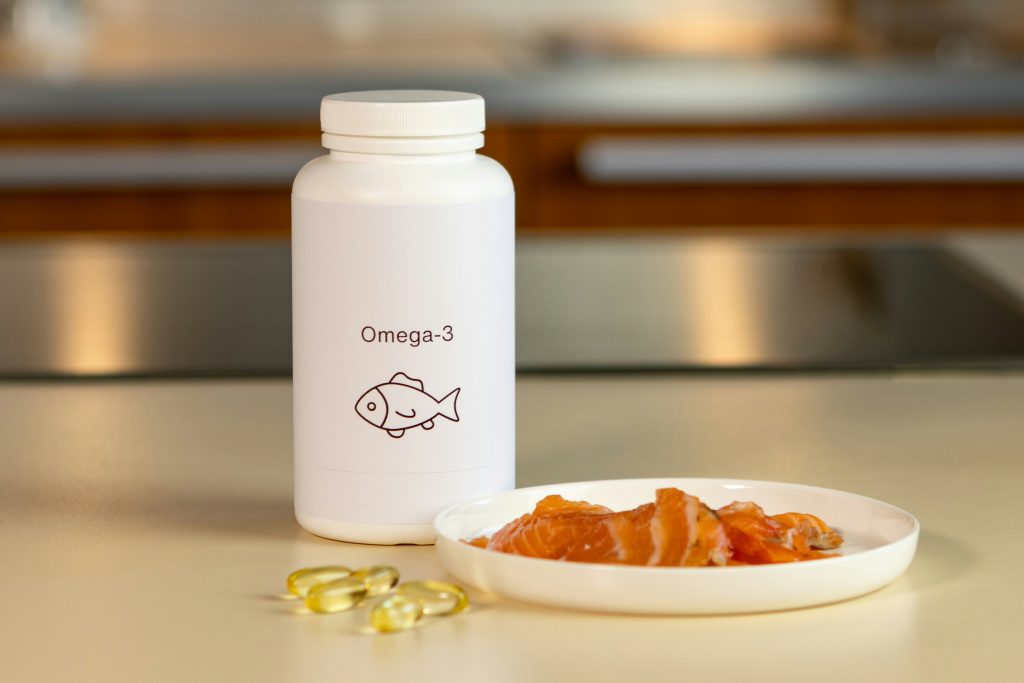
The Irish legend of An Bradán Feasa (the Salmon of Knowledge) tells of a salmon which ate the nuts from a mythical hazel tree and gained all the wisdom of the world. A young man named Fionn Mac Cumhaill caught the fish and burnt his thumb as he was cooking it. Sucking his fingers to ease the pain, all the knowledge of the world was passed onto him, and he became one of Ireland’s most prolific warriors.
In a more modern context, there has been growing interest in the relationship between omega-3s fatty acids, which are found in oily fish and supplements, and their potential health-boosting effects. Regarding psychiatry, the role of omega-3s in depression has been discussed in several previous Mental Elf blogs (Wessa, C., 2024; Clarke, G., 2023; Crick, D. 2023).
We now know that omega-3s have important roles in the brain, such as maintaining the integrity of nerve cell membranes, promoting formation of synapses (connections) between nerve cells, and reducing inflammation (Hsu et al, 2020).
Psychotic disorders such as schizophrenia are thought to be characterised by excessive pruning of synapses and increased inflammation in the brain (Howes et al, 2023). So, could omega-3 supplementation be used to prevent the onset of psychosis in people at high risk?
An initial trial (Amminger et al, 2010) recruited people who met criteria for being at “ultra-high risk” of psychosis (see Yung A & Nelson B, 2013 for more details on the ultra-high risk concept). In this trial, participants randomised to receive daily omega-3 supplements had a lower risk of subsequently developing psychosis compared to those who received a placebo pill.
However, two subsequent similar trials comparing omega-3 supplements to placebo found no evidence for a beneficial effect of omega-3s in reducing psychosis risk (McGorry et al, 2017; Qurashi et al, 2024). So, more research is needed to provide a clearer picture.
The authors of the paper that is the subject of this blog (Winter-van Rossum et al, 2024) conducted a randomised controlled trial in people at ultra-high risk of psychosis to see whether omega-3 supplementation for 6 months reduced the risk of developing psychosis compared to placebo.

Could omega-3 supplementation be used to prevent the onset of psychosis in people at high risk?
Methods
The authors performed a randomised controlled trial of people at ultra-high risk of psychosis, aged between 13 and 20 years, recruited from multiple sites across Europe and Israel.
Participants completed an interview called the Comprehensive Assessment of At-Risk Mental States and were eligible for inclusion if they met established criteria for being at “ultra high risk” of psychosis (Yung & Nelson, 2013).
Individuals were excluded if they had a current or past diagnosis of a schizophrenia-spectrum disorder; they were taking an antipsychotic in the previous 6 months or a mood stabiliser in the previous 2 weeks; or had taken an omega-3 supplement for more than 4 weeks within the last 6 months.
Eligible participants were then randomly allocated to take either a daily dose of omega-3s (in the form of a pill), or a placebo of similar size, shape and taste, for the next 6 months. Neither the researchers nor the participants knew if they were allocated the treatment or the placebo (double-blind).
The researchers followed up the participants on multiple occasions over the following 2 years. At these visits the participants completed interviews to assess if they had developed psychosis, which was the primary outcome of the study. Cox regression analysis was used to compare the transition rate between the two groups.
In addition, the researchers looked at a few secondary outcomes, including scores for severity of psychotic symptoms, depression symptoms, manic symptoms and global functioning. They also recorded any serious adverse events in both groups.
Results
In total, the researchers assessed 158 people for inclusion in the study and 146 were randomised. After exclusions, there were 67 people in the omega-3 treatment group and 68 in the placebo control group. The groups were balanced on age, sex, ethnicity, IQ and symptom scores.
In the omega-3 group, 5 of 67 (7.5%) developed psychosis over the 2-year follow-up period. This compared to 3 of 68 (4.4%) in the placebo group. It’s worth noting here that, due to dropout, the outcome assessment was only available for 46 people in the omega-3 group and 46 people in the placebo group.
The Cox regression analysis showed that the rate of transition to psychosis did not significantly differ between the two groups (HR 1.67, 95% CI: 0.40 to 6.98, P-value = 0.5).
For the secondary outcomes, there were no differences in the change in symptoms of psychosis, depression, mania or functioning between the two groups.
Thankfully, there was only a small number of adverse events in both groups. There were only 4 events reported in 5% or more of participants, including common cold, influenza, nausea, and suicidal ideation. In total, there were 19 adverse events in the omega-3 group, and 18 adverse events in the placebo group.

The rate of transition to psychosis was comparable between the two groups but sample sizes were small.
Conclusions
This trial is the third to show that, compared to placebo, omega-3 supplementation has no effect on the risk of developing psychosis among ultra-high risk individuals. The researchers also found no impact of omega-3s on symptom severity. They conclude:
The cumulative evidence from 3 international, large-scale studies demonstrating a lack of any protective effects of omega-3 on the transition to psychosis argues against future studies in this line of research and does not support its promotion as a preventive treatment option in UHR states for psychosis.

This trial is the third to show that, compared to placebo, omega-3 supplementation has no effect on the risk of developing psychosis among ultra-high risk individuals.
Strengths and limitations
This was a well-conducted randomised controlled trial from an experienced group of researchers. Participants were recruited across a number of international sites, which helps to increase generalisability and reduces the risk of bias compared to single-site studies.
Participants were randomly allocated to the omega-3 treatment or placebo control. Both the participants and the researchers did not know which group the participant was allocated to. Efforts were made to ensure the placebo pill resembled the omega-3 pill as closely as possible, to reduce the risk that participants might inadvertently discover which pill they had received (e.g. because of the taste), as this could bias the results.
Another strength was that the researchers analysed blood samples from the participants to measure the amount of omega-3 in their blood. The omega-3 group showed a significant increase in omega-3 levels in their blood tests from the start of the study to the end of their treatment, which wasn’t the case in the placebo group, suggesting that those randomised to omega-3 treatment did in fact take it. However, it’s worth noting that these were group-level analyses, so it remains uncertain how individual changes in omega-3 levels related to risk of psychosis.
As with all studies, there were also some limitations. 29 people dropped out of the study in the 6-month treatment phase (e.g. they developed psychosis already, or they were lost to follow-up). Data for the final outcome assessment were only available for 46 people in the omega-3 group and 46 people in the placebo group. This means that the results might not be representative of the enrolled group, because we don’t know what the outcomes were for the people who dropped out of the study.
The authors performed a sample size calculation which showed they needed 220 people in the study to have sufficient statistical power to detect significant effects of the intervention on the outcome. Unfortunately, the trial had to be stopped early due to difficulties with recruitment and enrolment due to the Covid-19 pandemic. Of course, this was outside the authors’ control, but nevertheless decreased the power of the statistical analyses and meant they could not recruit the number of participants needed per their calculations.

This study was well conducted, applying numerous measures to reduce bias and increase generalisability of the findings.
Implications for practice
What does this study add to our existing knowledge? So far, of four trials of omega-3 supplements in ultra-high risk groups, one study has found a beneficial effect in reducing the risk of transition to psychosis while 3 studies have not. The authors suggest that, together, these findings do not support further research on this particular question. However, it’s worth unpacking a few issues.
The authors themselves provide a few reasons for their negative findings. For example, several studies have found that the rate of transition to psychosis in ultra-high risk samples has been falling over time (Hartmann et al, 2016). One reason for this could be improvements in the non-pharmacological treatments such as counselling and psychological therapies. If these treatments are highly effective in reducing the transition rate, then it can be very difficult to show any improvement of other interventions (like omega-3s) over and above the effects of these other treatments.
Furthermore, compared to the more recent trials, the initial study that reported a beneficial effect had fewer participants on antidepressant medication, and used a slightly different outcome definition (Amminger et al, 2010). So, the groups and the findings may not be directly comparable.
Does this mean it is time to abandon all research on omega-3s in relation to prevention of psychosis? That might be throwing the baby out with the bath water (or possibly the salmon with the river water).
Given the largely negative results from the randomised controlled trials conducted so far, it is hard to argue for more research in ultra high-risk groups specifically. Indeed, there are broader concerns about the ultra-high risk paradigm: it requires specialist clinics that simply aren’t available in most places; involves intensive clinical interviews that need specialist training to administer; and even when such clinics are in place, most people with first episode psychosis do not come through these services anyway (Ajnakina et al, 2019). So, maybe we need to look at defining other high-risk groups in which to examine the effectiveness of omega-3s for psychosis prevention.
It’s also the case that the interventions used in these studies might not be optimal. Omega-3 supplements can oxidise and degrade over time (Cameron-Smith et al, 2015). It may be that, rather than a pill, we should look at dietary interventions where omega-3 intake is augmented by improving natural dietary sources of omega-3s.
Finally, waiting until the late teenage years (as is the case in the ultra high-risk group) might simply be too late. In schizophrenia, it is thought that there is excessive pruning of these connections at an early developmental stage (Howes & Onwordi, 2023). One of the main ways omega-3s are thought to help in brain development is by promoting connections between brain cells. Interestingly, my colleagues and I recently found that young people with low blood levels of omega-3s across childhood, adolescence and early adulthood experienced more symptoms of psychosis at age 24 compared to those whose levels of omega-3s stayed around average (Mongan et al, 2024).
Could intervening with omega-3s (either through diet or supplementation) in early childhood lead to reduced risk of psychosis in later life? We don’t know yet – but that’s exactly why we need to do more research. This study suggests the answer may not lie in the ultra high-risk group. But it could lie in using other interventions, defining other high-risk groups (for example targeting people who already have low omega-3 levels), or even aiming broader by increasing omega-3s at population level. Until we catch the salmon of knowledge, we need to rely on more research!

Until we catch the salmon of knowledge, we need to rely on more research to better understand whether/how omega-3s can be used to reduce psychosis risk.
Statement of interests
David has published two papers examining omega-3 levels in relation to psychosis risk (as below) but he had no role in the currently discussed paper.
Mongan D, Perry BI, Healy C et al. Longitudinal Trajectories of Plasma Polyunsaturated Fatty Acids and Associations With Psychosis Spectrum Outcomes in Early Adulthood. Biol Psychiatry. 2024 Nov 15;96(10):772-781. doi: 10.1016/j.biopsych.2024.04.004.
Mongan D, Healy C, Jones HJ et al. Plasma polyunsaturated fatty acids and mental disorders in adolescence and early adulthood: cross-sectional and longitudinal associations in a general population cohort. Transl Psychiatry. 2021 May 31;11(1):321. doi: 10.1038/s41398-021-01425-4.
Links
Primary paper
Winter-van Rossum I, Slot M, van Hell H et al. (2024)Effectiveness of Omega-3 Fatty Acids Versus Placebo in Subjects at Ultra-High Risk for Psychosis: The PURPOSE Randomized Clinical Trial. Schizophr Bull. 2024 Oct 25:sbae186. https://doi.org/10.1093/schbul/sbae186
Other references
Ajnakina O, David AS, Murray RM. ‘At risk mental state’ clinics for psychosis – an idea whose time has come – and gone! Psychol Med. 2019 Mar;49(4):529-534. doi: 10.1017/S0033291718003859.
Amminger GP, Schäfer M, Papageorgiou K, et al. Long-chain omega-3 fatty acids for indicated prevention of psychotic disorders. Arch Gen Psychiatry. 2010;67:146–154.
Cameron-Smith D, Albert BB, Cutfield WS. Fishing for answers: is oxidation of fish oil supplements a problem? J Nutr Sci. 2015 Nov 23;4:e36. doi: 10.1017/jns.2015.26
Clarke, G. Gut microbiome disruptions in depression: shifting the focus to metabolic signatures in blood. The Mental Elf. 2023
Crick, D. Does what you eat affect how you feel? The Mental Elf. 2023
Hartmann JA, Yuen HP, McGorry PD, et al. Declining transition rates to psychotic disorder in “ultra-high risk” clients: Investigation of a dilution effect. Schizophr Res. 2016;170:130–136.
Howes OD, Onwordi EC. The synaptic hypothesis of schizophrenia version III: a master mechanism. Mol Psychiatry. 2023 May;28(5):1843-1856. doi: 10.1038/s41380-023-02043-w.
Hsu M-C, Huang Y-S, Ouyang W-C. Beneficial effects of omega-3 fatty acid supplementation in schizophrenia: possible mechanisms. Lipids Health Dis. 2020 Jul 3;19:159. doi: 10.1186/s12944-020-01337-0
McGorry PD, Nelson B, Markulev C, et al. Effect of omega-3 polyunsaturated fatty acids in young people at ultrahigh risk for psychotic disorders: the NEURAPRO randomized clinical trial. JAMA Psychiatry. 2017;74:19–27.
Mongan D, Perry BI, Healy C et al. Longitudinal Trajectories of Plasma Polyunsaturated Fatty Acids and Associations With Psychosis Spectrum Outcomes in Early Adulthood. Biol Psychiatry. 2024 Nov 15;96(10):772-781. doi: 10.1016/j.biopsych.2024.04.004.
Qurashi I, Chaudhry IB, Khoso AB, et al. A randomised double-blind placebo-controlled trial of minocycline and/or omega-3 fatty acids added to treatment as usual for at risk Mental States: The NAYAB study. Brain Behav Immun. 2024;115:609–616.
Wessa, C. Anti-inflammatory treatments for youth depression: promising but not yet implementable. The Mental Elf. 2024.
Yung A, Nelson B. The ultra-high risk concept-a review. Can J Psychiatry. 2013 Jan;58(1):5-12. doi: 10.1177/070674371305800103.